A Quote by Susan Jacoby
Throughout the three decades preceding the Civil War, the anticlerical ethos of the radical abolitionists was used against them by religious opponents of emancipation, who . . . even described abolitionism itself as an atheist plot.
Related Quotes
You point out that war is only a symptom of the whole horrid business of human behavior, and cannot be isolated. And that, even if we abolish war, we shall not abolish hate and greed. So might it have been argued about slave emancipation, that slavery was but one aspect of human disgustingness, and that to abolish it would not end the barbarity that causes it. But did the abolitionists therefore waste their breath? And do we waste ours now in protesting against war?
You think OWS is radical? You think 350.org was radical for helping organize mass civil disobedience in D.C. in August against the Keystone Pipeline? We're not radical. Radicals work for oil companies. The CEO of Exxon gets up every morning and goes to work changing the chemical composition of the atmosphere. No one has ever done anything as radical as that, not in all of human history.
When in doubt, the rule of threes is a rule that plays well with all of storytelling. When describing a thing? No more than three details. A character's arc? Three beats. A story? Three acts. An act? Three sequences. A plot point culminating in a mystery of a twist? At least three mentions throughout the tale. This is an old rule, and a good one. It's not universal - but it's a good place to start.
Listen to these words of [apostle] Paul: "We war not against flesh and blood, but against principalities and powers, and the rulers of the darkness of this world and spiritual wickedness that's in high places." It's in "high places" that the plot against Black and Brown, and poor White is going on; it's spiritual wickedness that's way up in the ruling classes of religious people who don't want to see the little man rise. It's the principalities and the powers.



































